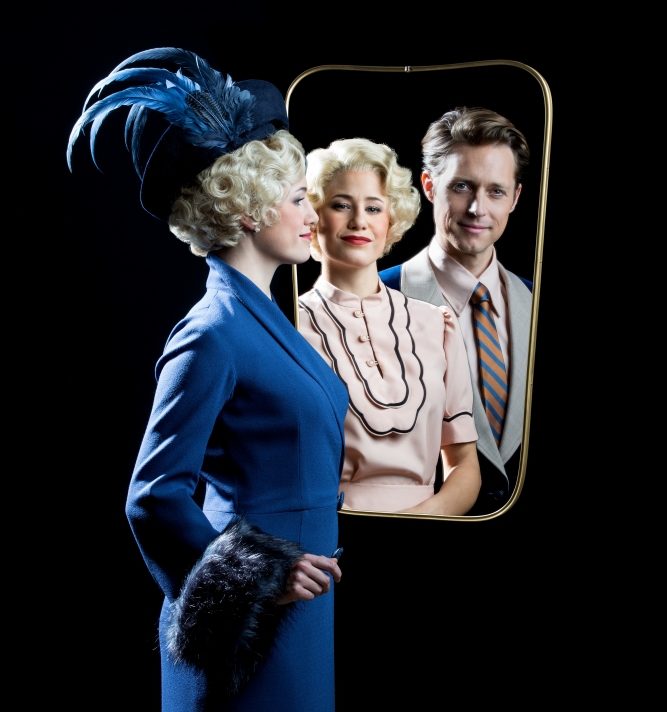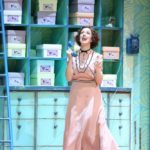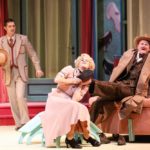 My Sister and I (Meine Schwester und ich) is the third Ralph Benatzky ‘operetta’ revived by Vienna Volksoper: the others, Im weissen Rössl (White Horse Inn) and Axel at Heaven’s Door. Benatzky’s were not strictly ‘operettas’- rather vehicles for his knack for composing hits. (Two numbers in Schwester were covered in the 30’s by nearly every operetta star.) Benatzky evoked a glittering, stylish world of the 30’s, the characters engaged in witty romcom. In fact, My Sister and I was a model for a new kind of “musical theatre”. Without pomp- no resemblance to grand operetta- it’s naturalistic, engaged with the psychology of the characters. And the musical numbers ‘arise naturally out of the rhythm of the conversation’. It was modern in incorporating the latest dances of the time: foxtrot, tango and shimmy. This Volksoper revival, directed by Robert Meyer, has it all.
My Sister and I (Meine Schwester und ich) is the third Ralph Benatzky ‘operetta’ revived by Vienna Volksoper: the others, Im weissen Rössl (White Horse Inn) and Axel at Heaven’s Door. Benatzky’s were not strictly ‘operettas’- rather vehicles for his knack for composing hits. (Two numbers in Schwester were covered in the 30’s by nearly every operetta star.) Benatzky evoked a glittering, stylish world of the 30’s, the characters engaged in witty romcom. In fact, My Sister and I was a model for a new kind of “musical theatre”. Without pomp- no resemblance to grand operetta- it’s naturalistic, engaged with the psychology of the characters. And the musical numbers ‘arise naturally out of the rhythm of the conversation’. It was modern in incorporating the latest dances of the time: foxtrot, tango and shimmy. This Volksoper revival, directed by Robert Meyer, has it all.
It begins in a court house, the unexpected divorce of the ‘dream couple’ Princess Dolly (Lisa Habermann) and Dr. Roger Fleuriot (Lukas Perman), who she’d engaged to organise her library. She falls for him, she unaware the job, for him, is only a stop-gap. Somehow, he’s not impressed by royalty, nor her wealth! So she invents her twin sister -a shoe saleswoman- to win him back. The love story, upturning class, is universal, and a staple of comedy. (Reminiscent of Oscar Wilde’s Ernest?) Love has no face, social rank, or costume, the Princess later admits.
The story begins in flashback to the Princess’s castle library (two years’ earlier). And what a stylish set! art-deco black, gold panels, high french windows, purple velvet-covered chairs, the library shelves with a recessed gold statue. And those ‘thoroughly modern’ clothes. (In the number ‘All for you’, Dolly’s companion Henrietta’s (Julia Koci) chic burgundy dress matches the braiding on Perman’s mustard-coloured suit.)
 He’s got 5,000 francs! Some for booze, some on patent shoes, he sings. He’s leaving without saying a word, she admonishes him. Habermann’s Princess is a platinum blonde, with coiffured curls, candy floss hair, wearing a peach-coloured chiffon gown, with a diamond-studded belt. Those chairs, I tell you, are a clever rip-off of Viennese jugendstil, Josef Hoffman’s (worth a fortune.) And the tables even include replicas of his exquisite, modernist silver ware. (‘You and I struggle in distress, they sing, Enough to make you cry.’)
He’s got 5,000 francs! Some for booze, some on patent shoes, he sings. He’s leaving without saying a word, she admonishes him. Habermann’s Princess is a platinum blonde, with coiffured curls, candy floss hair, wearing a peach-coloured chiffon gown, with a diamond-studded belt. Those chairs, I tell you, are a clever rip-off of Viennese jugendstil, Josef Hoffman’s (worth a fortune.) And the tables even include replicas of his exquisite, modernist silver ware. (‘You and I struggle in distress, they sing, Enough to make you cry.’)
The Count arrives, Carsten Süss in a grey-and-red plaid suit, with matching cap. Didn’t she read his letter? He sings of his acute longing; he’s travelled 100 miles! She retorts, proposal letters are pointless. He hears the Princess spent several evenings in the library? And, (to Henrietta), you still think she’s in love? Süss’s Count, grey-haired and paunchy, sings, wondering about her secret love. Why was he so high born?
The Princess herself – Habermann, in one of the hit numbers- sings, she’s fallen in love like a child: how ‘the world revolves around a little bit of love.’ But she won’t say who the man is.
In the library, he’s trying to work, while she’s whistling that tune! Is that how you spell your name, FLEURIOT. She’s made him a cheque for 10,000 francs. He can’t accept it. Has he no mother, no young ‘beloved’? She retreats to the piano. How did that song go, with Chopin and Radziwill. – So they were in love?- Wasn’t she wealthy, he poor! He taught music, she was a Princess. In their duet, she sings love’s not about appearances: Die Liebe fragt nicht nach Gesicht. But Fleuriot sings of a great divide between the Princess and himself. The music, Benatzky’s, is like champagne- bubbly, syncopated.
You must give a letter to my sister in Nancy – a saleswoman in a shoe shop! Dolly tells of her sister, who’s ‘already rejected a Count, Duke, and literary Professor’ – improvising the story as she goes along (the shop Filosel, name Giffard from the local directory). Dolly opens a bottle of champagne, which makes Fleuriot tipsy. ‘Today, my friend, it’s all the same love’, Fleuriot sings, sharing the bubbly with the servants- Volksoper Youth Chorus, stylishly choreographed. As Fleuriot, Perman’s voice (tenor) is that of a crooner, (doesn’t need the range here.) But he’s a natural for light comedy. The orchestra bristles as the Princess escapes, conspicuous wearing a cerise red outfit, matching cloak and hat.
That shoe shop in Nancy (France) really exists, the (Madame et Monsieur) fixtures, vertically arranged boxes, with actual shoes displayed.  But the girl upfront is Irma (the vivacious Johanna Arrouas), who’s leading a dance rehearsal for a Review. Unbelievable, a masterclass in how to do the shimmy! Filosel the proprietor (Robert Meyer, Volksoper’s director), wants to know why she’s open so late. He’s endured six years of her men coming and going. While he’s nearly broke, her every affair’s a money-spinner: she’s saved over 47,000 francs.
But the girl upfront is Irma (the vivacious Johanna Arrouas), who’s leading a dance rehearsal for a Review. Unbelievable, a masterclass in how to do the shimmy! Filosel the proprietor (Robert Meyer, Volksoper’s director), wants to know why she’s open so late. He’s endured six years of her men coming and going. While he’s nearly broke, her every affair’s a money-spinner: she’s saved over 47,000 francs.
In walks a lady in a red cloak. She’s very rich, but wants a job as a shoe saleswoman. He needs no extra staff, but she offers him 10,000 on account. She’ll pay him for the job! (But Filosel must vouch ‘Geneviève Giffard’ worked there for two years. ) What is she, a saboteur, or a bolshevik? Dolly returns and demands Irma’s dress off her back! Arrouas obliges, drops it, elegantly emerging in her silk slip.
Perman’s Fleuriot arrives, Dolly’s stint as salesgirl Genevieve is genuinely funny. He’s astounded by the resemblance, as she attempts to sell him some slippers. Can’t find anything: they had an “inventory” yesterday. He insists on paying, (11,500 francs). But she doesn’t know how to wrap them; lost in turquoise tissue. (She stares at him over the till; it’s as if he’s known her for years.) Habermann and Perman are magic together. The psychology is right. The man once intimidated by the princess. Now, no inhibitions, he invites her on a date…In the star number, ‘Once we’re alone Fraulein…that’s why I invite you for a glass of wine. (Ich lade sie ein, Fräulein.) ‘Let’s unwind’ soars on a high note. Volksoper orchestra sound like a 1930’s jazz band in cabaret . Mancusi, bopping in the pit, is having a ball.
Habermann and Perman are magic together. The psychology is right. The man once intimidated by the princess. Now, no inhibitions, he invites her on a date…In the star number, ‘Once we’re alone Fraulein…that’s why I invite you for a glass of wine. (Ich lade sie ein, Fräulein.) ‘Let’s unwind’ soars on a high note. Volksoper orchestra sound like a 1930’s jazz band in cabaret . Mancusi, bopping in the pit, is having a ball.
The Count arrives, on the trail of his rival Fleuriot. What’s she doing selling shoes? He loves me, thinks I’m his sister? Are you insane?…Arrouas’s Irma, now in a gorgeous apricot, cream outfit, cut open at the bust, works on the Count. She, the gold-digger, appears besotted by him. He boasts of his Hungarian estate; the rest, about his cattle, unrepeatable. Arrouas, in her aria, is he making fun of her, a shopgirl? Their duet, how thrilling to be in love (wie beglückend ist es, verliebt zu sein), is a classic.
Fleuriot has overcome his inhibitions…But why didn’t he make it with her sister? (she wants to know.) The difference in class, too great to overcome. It’s a cue for the show’s signature My girl is just a saleswoman in a shoe shop,(Meine Mädel ist nur eine Verkäuferin.) Lukas Perman, just gorgeous! But he can’t stand that cerise dress! she has to change back. It’s a fantasy, fetish thing.
Back to the divorce court. She, whether Geneviève or Dolly, loves him just as much. He has a beautiful life, says the Judge. But Fleuriot hated it: horse-riding at 6 am, golf at 11, hours of Wagner in the evening! Perman’s aria is a tour-de-force. Then, when he wants to kiss his wife, she’s smeared in oils and creams.- ‘You will bear the heavy burden of wealth with composure.’ This Benatzky, once a world-wide hit, is as brilliant as cut-glass in Meyer’s stylish revival. English subtitles. © P R 13.5.2019
Photos: Lisa Habermann, Dolly (Princess Saint-Labiche), Lukas Perman (Dr.Roger Fleuriot) © Johanes Ifkovits /Volksoper Wien
Lisa Habermann (Dolly) and Lukas Perman (Fleuriot); Johanna Arrouas (Irma, saleswoman); Lukas Perman, Lisa Habermann (Geneviève), George Wacks (M.Camembert, customer); featured image, Lisa Habermann, Lukas Perman.
All © Barbara Pálffy/ Volksoper Wien
